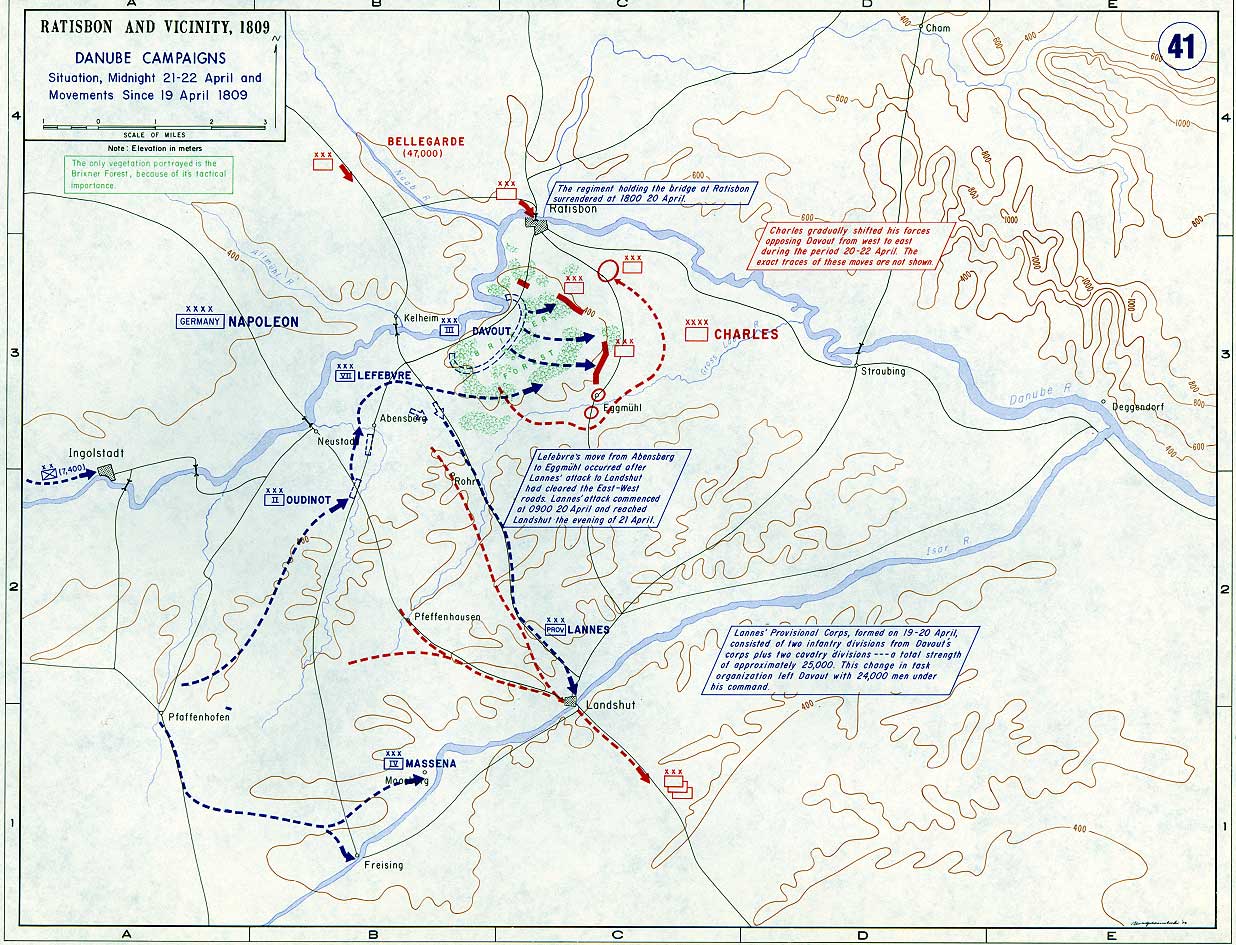|
Eggmühl
Eggmühl (formerly known in English as ''Eggmuhl'' or ''Eckmühl'') is a village of Germany, in Bavaria, on the Große Laaber, 20 km S.E. of Regensburg. Since 1978, it is part of the municipality Schierling. It is famous as the site of a fought on the 22 April 1809 during the |
Eggmühl Schloss
Eggmühl (formerly known in English as ''Eggmuhl'' or ''Eckmühl'') is a village of Germany, in Bavaria, on the Große Laaber, 20 km S.E. of Regensburg. Since 1978, it is part of the municipality Schierling. It is famous as the site of a fought on the 22 April 1809 during the |
Battle Of Abensberg
The Battle of Abensberg took place on 20 April 1809 between a Franco-German force under the command of Emperor Napoleon I of France and a reinforced Austrian corps led by Feldmarschall-Leutnant Archduke Louis of Austria. As the day wore on, Feldmarschall-Leutnant Johann von Hiller arrived with reinforcements to take command of the three corps that formed the Austrian left wing. The action ended in a complete Franco-German victory. The battlefield was southeast of Abensberg and included clashes at Offenstetten, Biburg-Siegenburg, Rohr in Niederbayern, and Rottenburg an der Laaber. On the same day, the French garrison of Regensburg capitulated. After Marshal Louis-Nicolas Davout's hard-fought victory at Battle of Teugen-Hausen the previous day, Napoleon determined to break through the Austrian defenses behind the Abens River. The emperor assembled a provisional corps consisting of part of Davout's corps plus cavalry and gave Marshal Jean Lannes command over it. Napoleon directed ... [...More Info...] [...Related Items...] OR: [Wikipedia] [Google] [Baidu] |
Battle Of Eckmühl
The Battle of Eckmühl, fought on 22 April 1809, was the turning point of the 1809 Campaign, also known as the War of the Fifth Coalition. Napoleon I had been unprepared for the start of hostilities on 10 April 1809, by the Austrians under the Archduke Charles of Austria and for the first time since assuming the French Imperial Crown had been forced to give up the strategic initiative to an opponent. Thanks to the dogged defense waged by the III Corps, commanded by Marshal Davout, and the Bavarian VII Corps, commanded by Marshal Lefebvre, Napoleon was able to defeat the principal Austrian army and wrest the strategic initiative for the remainder of the war. Strategic situation Operating over a fifty-mile front, from Regensburg (Ratisbon to the French) to Pfaffenhofen, marked by stretches of rugged, wooded terrain, neither the French nor the Austrians had developed adequate intelligence about their opponent's strength, dispositions or intentions. Assuming that the bulk of ... [...More Info...] [...Related Items...] OR: [Wikipedia] [Google] [Baidu] |
Bavaria
Bavaria ( ; ), officially the Free State of Bavaria (german: Freistaat Bayern, link=no ), is a state in the south-east of Germany. With an area of , Bavaria is the largest German state by land area, comprising roughly a fifth of the total land area of Germany. With over 13 million inhabitants, it is second in population only to North Rhine-Westphalia, but due to its large size its population density is below the German average. Bavaria's main cities are Munich (its capital and largest city and also the third largest city in Germany), Nuremberg, and Augsburg. The history of Bavaria includes its earliest settlement by Iron Age Celtic tribes, followed by the conquests of the Roman Empire in the 1st century BC, when the territory was incorporated into the provinces of Raetia and Noricum. It became the Duchy of Bavaria (a stem duchy) in the 6th century AD following the collapse of the Western Roman Empire. It was later incorporated into the Holy Roman Empire, became an ind ... [...More Info...] [...Related Items...] OR: [Wikipedia] [Google] [Baidu] |
Große Laaber
Große or Grosse is a German surname. Notable people with the surname include: *Demetrius Grosse *Maurice Grosse *Katharina Grosse *Ben Grosse *Hans-Werner Grosse *Heinz-Josef Große *Julius Grosse Julius Waldemar Grosse (25 April 1828 – 9 May 1902), German poet, the son of a military chaplain, was born at Erfurt. Biography He received his early education at the gymnasium in Magdeburg, and on leaving school and showing disinclination f ... {{surname German-language surnames ... [...More Info...] [...Related Items...] OR: [Wikipedia] [Google] [Baidu] |
Regensburg
Regensburg or is a city in eastern Bavaria, at the confluence of the Danube, Naab and Regen rivers. It is capital of the Upper Palatinate subregion of the state in the south of Germany. With more than 150,000 inhabitants, Regensburg is the fourth-largest city in the State of Bavaria after Munich, Nuremberg and Augsburg. From its foundation as an imperial Roman river fort, the city has been the political, economic and cultural centre of the surrounding region; it is still known in the Romance languages by a cognate of its Latin name of "Ratisbona" (the version "Ratisbon" was long current in English). Later, under the rule of the Holy Roman Empire, it housed the Perpetual Diet of Regensburg. The medieval centre of the city was made a UNESCO World Heritage Site in 2006 because of its well-preserved architecture and the city's historical importance for assemblies during the Holy Roman Empire. In 2014, Regensburg was among the top sights and travel attractions in Germany. Histor ... [...More Info...] [...Related Items...] OR: [Wikipedia] [Google] [Baidu] |
Schierling
Schierling is a municipality in the district of Regensburg in Bavaria in Germany Germany,, officially the Federal Republic of Germany, is a country in Central Europe. It is the second most populous country in Europe after Russia, and the most populous member state of the European Union. Germany is situated betwe .... References Regensburg (district) {{Regensburgdistrict-geo-stub ... [...More Info...] [...Related Items...] OR: [Wikipedia] [Google] [Baidu] |
Statistisches Bundesamt
The Federal Statistical Office (german: Statistisches Bundesamt, shortened ''Destatis'') is a federal authority of Germany. It reports to the Federal Ministry of the Interior. The Office is responsible for collecting, processing, presenting and analysing statistical information concerning the topics economy, society and environment. The purpose is providing objective, independent and highly qualitative statistical information for the whole public. About 2300 staff members are employed in the departments in Wiesbaden, Bonn and Berlin. The department in Wiesbaden is the main office and runs the largest library specialised in statistical literature in Germany. It is also the Office of the President who is also by tradition, but not by virtue of the office, the Federal Returning Officer. In this position, they are the supervisor of the elections of the German Parliament ("Bundestag") and of the European Parliament. The Berlin Information Point is the service centre of the Federal O ... [...More Info...] [...Related Items...] OR: [Wikipedia] [Google] [Baidu] |
English Language
English is a West Germanic language of the Indo-European language family, with its earliest forms spoken by the inhabitants of early medieval England. It is named after the Angles, one of the ancient Germanic peoples that migrated to the island of Great Britain. Existing on a dialect continuum with Scots, and then closest related to the Low Saxon and Frisian languages, English is genealogically West Germanic. However, its vocabulary is also distinctively influenced by dialects of France (about 29% of Modern English words) and Latin (also about 29%), plus some grammar and a small amount of core vocabulary influenced by Old Norse (a North Germanic language). Speakers of English are called Anglophones. The earliest forms of English, collectively known as Old English, evolved from a group of West Germanic (Ingvaeonic) dialects brought to Great Britain by Anglo-Saxon settlers in the 5th century and further mutated by Norse-speaking Viking settlers starting in the 8th and 9th ... [...More Info...] [...Related Items...] OR: [Wikipedia] [Google] [Baidu] |
War Of The Fifth Coalition
The War of the Fifth Coalition was a European conflict in 1809 that was part of the Napoleonic Wars and the Coalition Wars. The main conflict took place in central Europe between the Austrian Empire of Francis II, Holy Roman Emperor, Francis I and Napoleon I of France, Napoleon's First French Empire, French Empire. The French were supported by their client states, including the Kingdom of Italy (Napoleonic), Kingdom of Italy, the Confederation of the Rhine and the Duchy of Warsaw. Austria was supported by the Fifth Coalition which included the United Kingdom of Great Britain and Ireland, United Kingdom, Kingdom of Portugal, Portugal, Spain and the Kingdoms of Kingdom of Sardinia, Sardinia and Kingdom of Sicily, Sicily, though the latter two took no part in the fighting. By the start of 1809 much of the French army was committed to the Peninsular War against Britain, Spain and Portugal. After France withdrew 108,000 soldiers from Germany, Austria attacked France to seek the ... [...More Info...] [...Related Items...] OR: [Wikipedia] [Google] [Baidu] |
Württemberg
Württemberg ( ; ) is a historical German territory roughly corresponding to the cultural and linguistic region of Swabia. The main town of the region is Stuttgart. Together with Baden and Hohenzollern, two other historical territories, Württemberg now forms the Federal State of Baden-Württemberg. Württemberg was formerly also spelled Würtemberg and Wirtemberg. History Originally part of the old Duchy of Swabia, its history can be summarized in the following periods: *County of Württemberg (1083–1495) * Duchy of Württemberg (1495–1803) *Electorate of Württemberg (1803–1806) *Kingdom of Württemberg (1806–1918) *Free People's State of Württemberg (1918–1945) After World War II, it was split into Württemberg-Baden and Württemberg-Hohenzollern due to the different occupation zones of the United States and France. Finally, in 1952, it was integrated into Baden-Württemberg. Stuttgart, the historical capital city of Württemberg, became the capital of the p ... [...More Info...] [...Related Items...] OR: [Wikipedia] [Google] [Baidu] |
Napoleon
Napoleon Bonaparte ; it, Napoleone Bonaparte, ; co, Napulione Buonaparte. (born Napoleone Buonaparte; 15 August 1769 – 5 May 1821), later known by his regnal name Napoleon I, was a French military commander and political leader who rose to prominence during the French Revolution and led successful campaigns during the Revolutionary Wars. He was the ''de facto'' leader of the French Republic as First Consul from 1799 to 1804, then Emperor of the French from 1804 until 1814 and again in 1815. Napoleon's political and cultural legacy endures to this day, as a highly celebrated and controversial leader. He initiated many liberal reforms that have persisted in society, and is considered one of the greatest military commanders in history. His wars and campaigns are studied by militaries all over the world. Between three and six million civilians and soldiers perished in what became known as the Napoleonic Wars. Napoleon was born on the island of Corsica, not long af ... [...More Info...] [...Related Items...] OR: [Wikipedia] [Google] [Baidu] |






